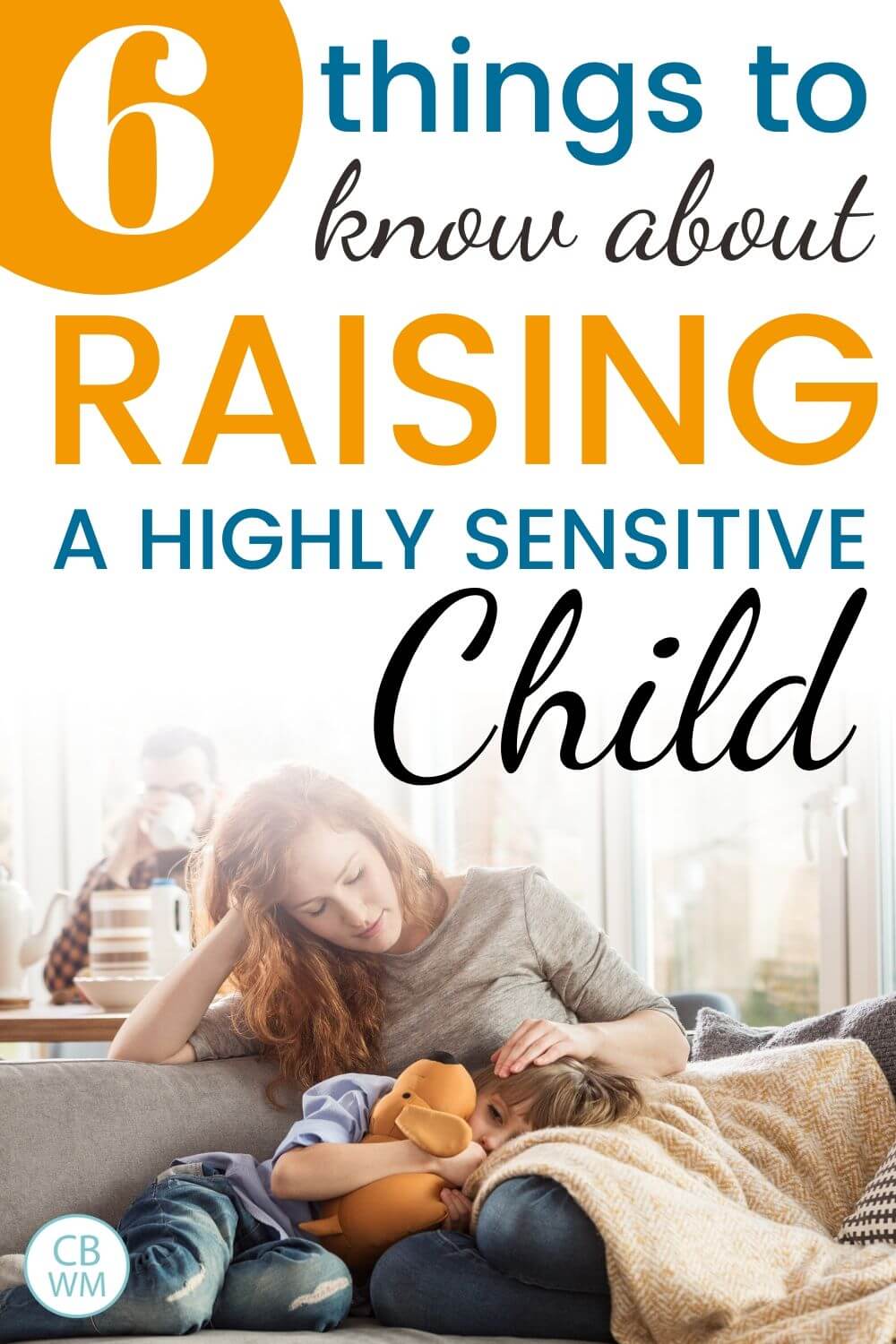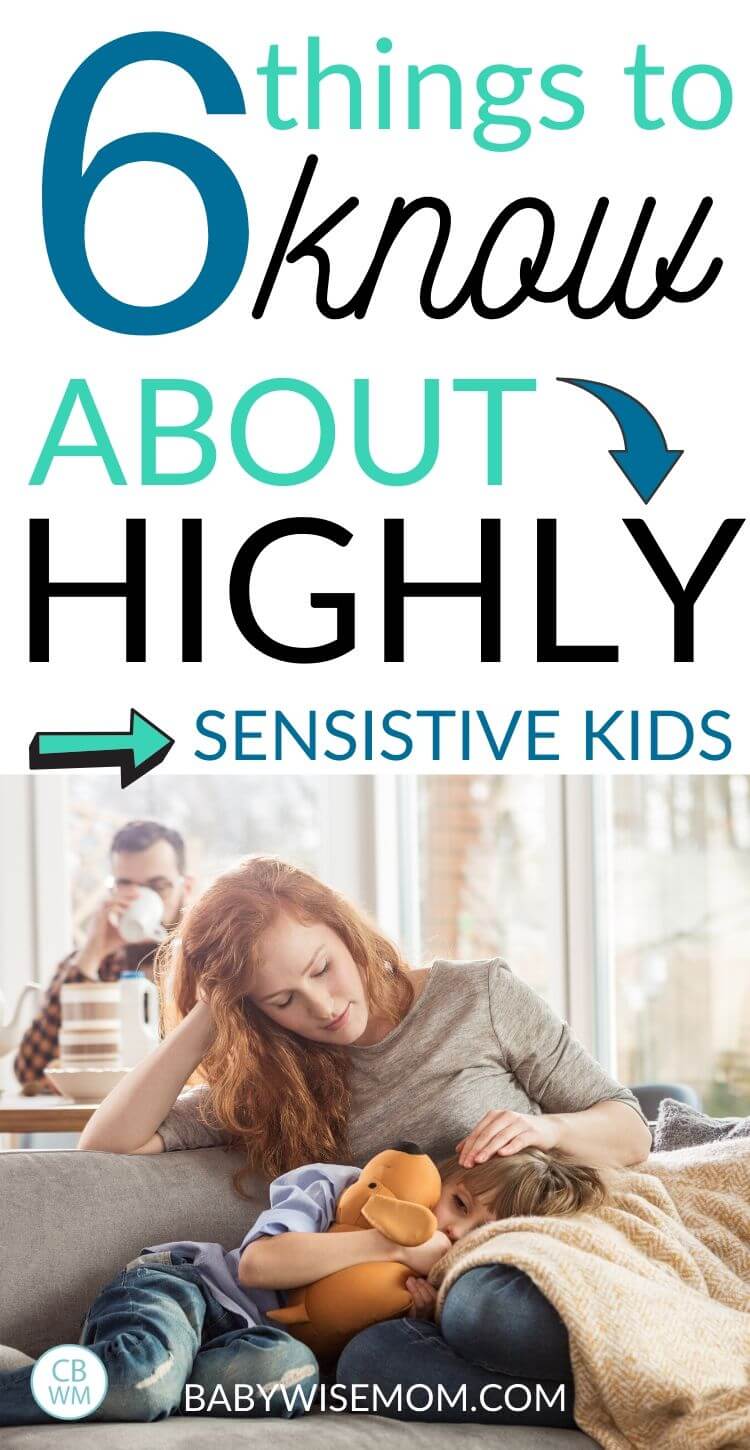What parents need to know about raising a highly sensitive child. What traits to expect and why anger might not be something to discipline for.

by Caitlin Rogers
I have always known that my six-year-old, Theo, was wired a bit differently than the average child.
When he first learned how to stack blocks, he made every effort to stack them so that they were all facing the same direction.
He could not handle not having socks on. Something about the sensation of his feet touching the ground was more than he could handle.
Birthday parties and other big events always set him off. I’d be the mom standing at the door, trying to coax my crying toddler to come in and join the fun.
Every spring when we put shorts on him for the first time, he could NOT handle the change from pants to shorts and would cry for hours on end.
So while there was nothing overly extreme and no red flags that made me seek outside help, my gut knew that there was “something” there.
Have you ever read a book that so perfectly described something you experience, that all you can think is “YES. YES, YES, YES.?”
That was me when I read the book “The Highly Sensitive Child” by Elaine N Aron. All of a sudden, everything made perfect sense as to why my child acted the way he did.

If you’re wondering if your child is highly sensitive as well, you can read my post here: How to Tell If You Have a Highly Sensitive Child.
Once you’ve established that, I highly suggest you purchase the book! Until then, here are 6 things you really need to know about raising a highly sensitive child.
And if you don’t have a highly sensitive child? You should still read this post because 15-20% of our population are highly sensitive people and not very many people understand what that actually means!

Post Contents
- 1. Highly Sensitive Does Is Not the Same as Sensitive or Emotional
- 2. Structure, Routine, and Sleep Are Crucial for a Highly Sensitive Child
- 3. Transitions Are Especially Hard
- Bedtime is a Transition
- 4. Some Highly Sensitive Children Need More Sleep
- 5. Raising a Highly Sensitive Child Can Be Isolating
- 6. Your HSC is Extraordinary
- Related Posts on This Blog
1. Highly Sensitive Does Is Not the Same as Sensitive or Emotional
You may hear the term “highly sensitive child” and jump to the conclusion that it means the child is overly emotional. That they are irrational and fussy and cry easily.
The truth is that being Highly Sensitive is actually a personality trait and has to do with all of the senses, not just emotions.
According to Dr. Elaine Aron, author of “The Highly Sensitive Person” and “The Highly Sensitive Child,” a person who has the highly sensitive personality trait has a sensitive nervous system, is aware of subtleties in his/her surroundings, and is more easily overwhelmed when in a highly stimulating environment.
Mainly, their brains process information more thoroughly than the average person.
Related –> Why We Need to Stop Acting Like Being a Sensitive Boy is a Bad Thing
2. Structure, Routine, and Sleep Are Crucial for a Highly Sensitive Child
Now, these things are important for ALL children, but they are especially important for highly sensitive children.
Last year, our son, Theo, was in AM preschool 5 days a week. While he loved it, he was really excited about summer break and spending his days at the beach, park, playing in the backyard, and all of the fun that summer entails.
I quickly realized that our days were too free for his little mind. Not knowing in advance what each day would hold was too much for him.
He was moody, emotional, and in meltdown mode almost constantly.
Even though we had a general structure and routine to our day, some days we stayed home and other days we went and did all the things.
I ended up getting a big whiteboard and on Sunday night I would write out a general schedule from Monday-Friday.
Just having a general overview of what his week entailed was enough to keep him from feeling unsettled.
Related –> How to Discipline a Highly Sensitive Child: 8 Simple Strategies
3. Transitions Are Especially Hard
Your HSC’s difficulty is perfectly understandable if you consdier that every change involves processing stiumlation that was not there before. Put yourself in your child’s place: All the thinking you did preparing for and doing A must be sorted through and altered for doing B and if B is new, that means even more processing and planning
The Highly Sensitive Child, Pg 179
Let’s stick with my example of transitioning from the school year to summer.
That’s a GOOD transition, right?
That doesn’t matter to a highly sensitive child. Transitions are a lot for them to process, even if it’s a fun transition.
It can leave them feeling off-balance as they get used to their new environment or routine.
It’s good to prepare them in advance by talking through the transition and explaining what’s going to change, however, oftentimes the anticipation is worse than the actual transition.
I’ve learned that talking with Theo about changes will escalate the problem. It’s best to be brief, concise, let them know that they can come to us with questions, and then let it be until we are actually going through the transition.
You have to trust that they will get through the transition in their own time, not put pressure on them, and make sure they have plenty of time to play, as it’s one of the best ways to make them forget their stressors.
Bedtime is a Transition
Speaking of transitions, bedtime is a huge transition, and it happens daily. We have many problems with bedtime.
It’s not that Theo doesn’t want to go to bed, or gets out of bed… he simply struggles with the transition.
He’s too tired to put his pajamas on, so he lies on his floor and insists that he needs help. He’s too tired to walk up the stairs and wants someone to carry him.
He doesn’t actually fight bedtime, because once he’s ready for bed, he is completely content to get into bed and go to sleep.
He fights the transition to bedtime.
Once we realized this was going on, combined with the fact that he is one of the HSC who needs extra sleep (see my point below), we were able to figure out a few ways to help.
- Consistency: while we are always fairly consistent with bedtime, we looked for ways that we could be even MORE consistent. Instead of reading a random story before bedtime, we started to read one chapter from a series of chapter books (The Boxcar Children is our current book).
- Flexibility: While consistency is crucial, bedtime is also a good time to work on flexibility. We use teeth brushing as our flexibility practice. We usually brush them upstairs, but randomly we will bring toothbrushes to the downstairs bathroom. If Theo is overtired or overstimulated, or just having an off day, we don’t use that day as a practice day.
- Early early early: We start the bedtime routine as early as possible. As the night goes on, Theo gets increasingly tired and starts to spiral. As soon as we are done with dinner, we have all of the kids get their pajamas on and brush their teeth so that they’re ready for bed when the time comes.
You could print out a picture schedule for bedtime (and wake up time!) to help your HSC through the transition with a visual aid.
Related –> How to Help Children With Big Transitions
4. Some Highly Sensitive Children Need More Sleep
While not all highly sensitive children have high sleep needs, it is common that they do, and my son definitely does.
Let’s put it into perspective.
Think about when you are the most exhausted as an adult. We are worn out after days that are overwhelming. We crash and burn when our mental load is at capacity when our brains are in overdrive.
This is every day for a highly sensitive person. Every. Single. Day.
Even if your highly sensitive child doesn’t require extra sleep, getting enough sleep is crucial. Getting adequate sleep will help to calm down their nervous system which helps it from being in a constant state of overdrive.
Read –> The Most Effective Calming Strategies for Children
5. Raising a Highly Sensitive Child Can Be Isolating
Oftentimes the actions of a highly sensitive child can come across as misbehavior.
It appears that they’re throwing a fit because they’re not getting what they want when the reality is they are crying tears of frustration because things aren’t going according to the plan they had in their head.
One day, we had friends over for dinner, and Theo absolutely melted down when he went in to sit down for dinner and realized that somebody was sitting in his seat.
He started sobbing, yelling and ran out of the room. Prior to reading The Highly Sensitive Child, I wouldn’t have understood and there would have been some sort of consequence for rude behavior.
However, I realized that he was genuinely upset and didn’t know how to process this change.
I have friends who have 6-year-olds with extra-curricular activities at 6:30 at night. By that time, we are already in pajamas and working through our bedtime routine!
There are only a handful of Disney movies we can watch because they are too scary or stressful for Theo. He picks up on emotions and details that most children his age don’t pick up on.
All of these factors can make you feel as if you’re on an island, parenting in territory that very few parents understand…. which brings me to my next point.

6. Your HSC is Extraordinary
It’s easy to focus on the difficulties of raising a highly sensitive child. It’s easy to see the challenges and struggles they bring to us as parents.
Most posts that I write about being highly sensitive are about the difficulties because I’m trying to offer help based on my journey with a highly sensitive child.
But, friends, I’m saving the best point for last.
You are raising an extraordinary person and the more you learn about being highly sensitive, the better you can help them navigate the waters.
Highly sensitive people are aware of every tiny nuance and feel everything on a higher level. So while this means that as children, they can throw some epic fits, it also means that their love is strong and hard.
Because sensitive people are such keen observers and thinkers, they are traditionally the inventors, lawmakers, healers, historians, scientists, artists, teachers, counselors, and spiritual leaders. They are the advisers to rulers and warriors, the visionaries and the prophets. In their communities, they are often the opinion leaders, the ones others seek out on how to vote or solve family problems. They make extraordinary parents and partners. They are compassionate and care deeply about social justice and the environment.
The Highy Sensitive Child, pg 66-67
As someone who is raising a highly sensitive child and is also married to a highly sensitive person, I can attest to the above statement.
Highly sensitive people are a true gift to the world, and it is a true privilege to be raising one.

Hi, there! I’m Caitlin, a stay at home mom to identical twin girls and a preschool-aged little boy. I learned a lot about managing a household with 3 under 3 and I strive to share that knowledge with my readers. I’m passionate about sharing our tips for sleep, discipline, and schedules to help other moms make the most of their busy days! Visit her at twinmomandmore.com

Hi! I am an adult HSP, and I was brought to tears over reading this. Back in the 1980s-90s, there wasn’t enough info about us out there, and I can remember being reprimanded, disciplined, chided for being “too sensitive.” Even my dad, whom we later discovered is also an HSP, didn’t know quite what to do or how to handle me. After a few years of counseling, my therapist explained to me what I was. Suddenly it all became clear.
It means so much to me to see parents who want to put in that extra kindness, love, and sensitivity in raising an HSP child, because we can be the most wonderful children if given the chance. All we need is kindness and love, a little understanding.
I am suspecting my 8-year-old daughter may also be an HSP. There are times when I see her getting overstimulated and give her permission to just take a little break, or I will lovingly pull her aside to another room for a few minutes to talk anything out and let her calm down. She really values that I understand her, and this usually also helps to alleviate some of that tension and stress caused by overstimulation for her. When she returns to the scene, she’s usually calmer and happier.
I fully agree… many of us DO need more sleep, or at least enough sleep. I thrive best on 8-9 hours a night.
I’m just so moved by this article!!! I wasn’t sure if you were also an HSP, but just the fact that you care so much about your son being an HSP really moved me. I hope more parents of HSPs will read this (and also those with non-HSP but also wonderful kids). Because it is so helpful!
Hi Christina,
Thank you so much for your thoughtful comment. It means so much to bloggers when we hear that our words are impacting others!
I am definitely NOT a highly sensitive person, however, my husband is, which is what made me start researching the highly sensitive person.
Oddly enough, my husband struggles more with parenting our son than I do! I think as a non-HSP, I’ve seen how damaging my words and actions can be to my husband. I’ve said things and immediately regretted them; I’ve talked him into going to an event after a busy week and seen on his face that it was a bad idea.
My husband has also expressed that he overlooks our son’s feelings because he’s been taught to overlook and ignore his own feelings. He tends to be more firm with enforcing rules regardless of the scenario or how our son may be feeling.
I’m by no means saying that I don’t enforce rules, but… well, here is an example. My son has been bouncing off the walls and having trouble focusing and obeying this week and my husband was being very firm with correcting his behavior. Something felt off to me, and I started questioning why our son was acting off. Then it hit me: after a year of being out of school and having hardly any activities, we were starting soccer this week. Ding ding ding!
We had a long conversation about what to expect at soccer, how many people might be there, and what he would do if he was nervous. While his behavior didn’t improve immediately (it’s not really disobedience, just extreme silliness), it’s much easier to have patience knowing why he’s acting that way and I hope it makes him feel secure knowing that we’re there for him.
Anyways, thank you again for your kind words and thoughts!